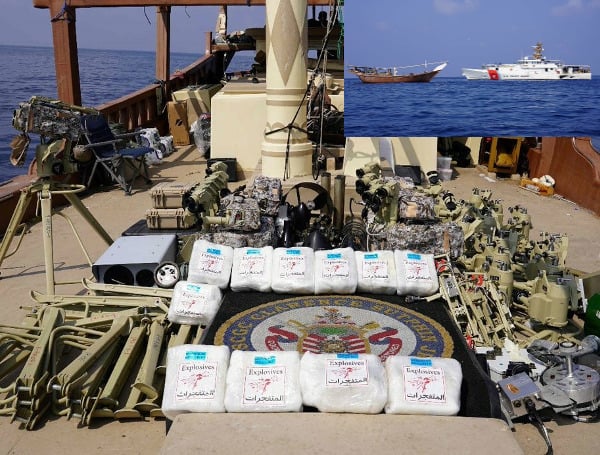Reps Mark Green (TN-07) and Jared Moskowitz (FL-23) introduced the Combating Houthi Threats and Aggression Act, which imposes sanctions on those complicit in or who materially support Houthi attacks, past or present.
The law also requires the compilation of three reports on the Houthis’ ability to endanger US national security and foreign policy goals, impediments to freedom of navigation, and violations of the United Nations Arms Embargo in Yemen.
“Iranian-backed Houthi terrorists pose a direct threat to our servicemembers and the freedom of navigation in the Red Sea. Despite knowing this, the Biden administration is dragging its feet. Until we understand the Houthis’ capabilities to threaten our national security and foreign policy efforts, our interests are even more at risk. Placing sanctions on the Houthis and getting intelligence on their capabilities will give us the tools necessary to protect our servicemembers, national security, and the free navigation of the Red Sea.”
Read: Iran Threatens To Attack Israel With New Weapons “Not Used Before”: A Growing Concern
“The threat posed by the Houthi terrorists and the Iranian Ayatollah that backs them cannot be taken lightly. My bill demands answers and brings accountability. American lives are at risk. We have a responsibility to protect Americans and defend our national security. My bill aims to do both,” said Green.
This legislation was cosponsored by House Foreign Affairs Committee Chairman Michael McCaul (TX-10) and Chairman of the Subcommittee on the Middle East, North Africa, and Central Asia Joe Wilson (SC-02), among others.
Who are the Houthis, and Why are they Attacking Red Sea Ships?
The Houthis, an Iranian-backed rebel group, emerged in the 1990s and champion Yemen’s Shia Muslim minority, the Zaidis. They consider Israel and the wider West as their enemies, aligning themselves with armed groups like Hamas and Hezbollah. The Houthis started launching drone and missile attacks towards Israel in response to the war in the Gaza Strip.
On November 19, the Houthis hijacked a commercial ship in the Red Sea, marking the beginning of a series of attacks on vessels in the region. Initially, they claimed to target ships connected with Israel or heading to/from Israel. However, many of the attacked vessels had no connection with Israel. More recently, the Houthis have targeted ships tied to owners or operators in the UK or US in response to airstrikes on their positions.
Read: US Strikes Houthi Targets After Terrorists Fired On USS Laboon
Impact on Global Trade
The Red Sea is a vital waterway through which almost 15% of global seaborne trade usually passes.
The Houthi attacks have compelled major shipping companies to reroute their vessels, opting for a longer route around southern Africa instead. This disruption has significant implications for trade, leading to increased costs, delays, and logistical challenges.
The Ongoing Conflict in Yemen
To understand the Houthi attacks, it is crucial to examine the broader context of the conflict in Yemen. In the early 2000s, the Houthis rebelled against Yemen’s long-time authoritarian president, Ali Abdullah Saleh, seeking greater autonomy for their homeland in the north of Yemen.
During the 2011 Arab Spring, they seized control of the northern province of Saada and eventually took over the Yemeni capital, Sanaa, forming an alliance with Saleh and loyal security forces.
The conflict escalated in 2015 when the rebels seized large parts of western Yemen, prompting neighboring Saudi Arabia to form a coalition of Arab countries to intervene.
Despite years of air strikes and ground fighting, the Houthis remain in control of Sanaa and the north-west of Yemen, including the Red Sea coastline.
Efforts for a peace deal and a UN-brokered truce have been ongoing since April 2022. Tragically, the war has resulted in the deaths of over 160,000 people and the displacement of more than four million.
Read: Cargo Ship Sinks After Houthi Attack In Red Sea, Dumping 21,000 Metric Tons Of Fertilizer
Why are the UK and US Bombing Yemen?
The US and UK began carrying out air strikes on Houthi targets in Yemen in January 2024. President Joe Biden stated that these strikes were a direct response to the attacks on Red Sea ships, which jeopardized trade and threatened freedom of navigation.
However, the effectiveness of these strikes in curbing Houthi attacks remains questionable.
Backing of the Houthis and Weapon Supply
The US accuses Iran of enabling the Houthis to target ships, urging Tehran to stop its support. Iran denies involvement, asserting that it only supports the Houthis politically.
The US and Saudi Arabia claim that Iran has violated a UN arms embargo by smuggling weapons, including drones, cruise missiles, and ballistic missiles, to the Houthis during Yemen’s civil war. These weapons have been used in attacks on Saudi Arabia and the United Arab Emirates.
The Control and Governance of the Houthis
The Houthis control Sanaa and the north-western parts of Yemen, including the Red Sea coastline. This region is home to the majority of Yemen’s population, and the Houthis have established a de facto government that collects taxes and prints money.
On the other hand, the internationally-recognized government of Yemen is based in the southern port of Aden, overseen by the eight-member Presidential Leadership Council.
Help support the Tampa Free Press by making any small donation by clicking here.
Android Users, Click To Download The Tampa Free Press App And Never Miss A Story. Follow Us On Facebook and Twitter. Sign up for our free newsletter.

